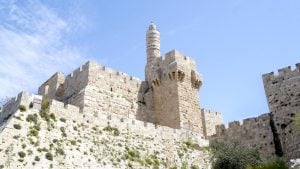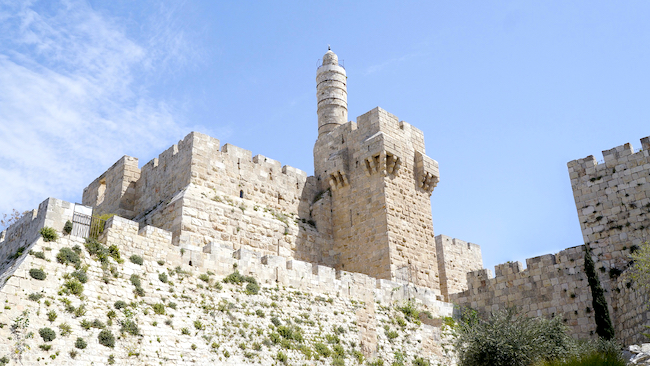
Yechezkel 37:15–28
Unification: Prerequisite to Redemption
Chazal inform us that the second Bais Hamikdash was destroyed because of
division and dissention. They attest to the fact that the Jewish nation was pious
and benevolent, but that the Jewish people harbored inner hatred towards one
another and could not appreciate each other’s fortune and success. Chazal
point to the first brief seventy-year Jewish exile caused by idolatry and
immorality and compare it to the now approaching two thousand years of
Jewish exile. They deduce from this that fragmentation has the most powerful
impact on withholding redemption. (Yoma 9b, Yerushalmi Yoma 1:1) This
week’s Haftarah helps us understand the reason for this.
Unity, One Inseparable Unit
The Haftarah begins with Hashem’s instruction to Yechezkel Hanavi to take two
pieces of wood and inscribe them with the names of the Jewish kingdoms, Yehuda and
Yosef. Hashem then said, “Bring them near one another and they shall be one in your
hands.” (37:17) Radak interprets this to mean that Yechezkel should hold the pieces
alongside each other and that they will miraculously become one solid piece of wood.
Radak explains that the unification of the wooden pieces symbolizes the miraculous
unification of the Jewish nation.
As stated, the individual pieces of wood represented the two kingdoms of Israel.
Although Hashem guaranteed Dovid Hamelech an everlasting dynasty, that pledge did
not preclude division and dissention. As we have learned, Dovid’s kingdom suffered a
severe split after his son, Shlomo Hamelech’s passing. Hashem appointed Yeravam ben
Nevat, a descendent of the tribe of Yosef, to rule over ten of the twelve tribes of the
Jewish people who settled mostly in the Samarea of Eretz Yisroel. Yeravam erroneously
corrupted his kingdom and brought its people to sever all ties with their brethren, the
Judean kingdom, and eventually to be exiled and separated from the remaining Jewish
people until the time of Mashiach. Hashem informed Yechezkel that the two kingdoms
would eventually come together and form one inseparable unit. He displayed through the
unification of the two pieces of wood that the Jewish people’s unity will be so perfect that
it would leave no trace of any previous split. The entire nation’s sense of kinship will be
so intense that it will resemble one solid piece of wood, void of any factions or
fragmentation.
Reunifying Hashem with His People
Yechezkel continued and stated in Hashem’s name, “And I will purify them…and My
Presence will rest upon them…forever.” (37:23, 27-28) The above verses predict the
final phase of the Jewish nation’s unity experiences: Hashem’s reunification with His
people. In the era of Mashiach all aspects of unity will be achieved. The Jewish nation
will become one inseparable unit and Hashem will reunite with His people. As in the
Jewish nation’s unity, Hashem’s reunification with His people will be inseparable and
everlasting.
It is important to note the order of these phases. The first phase will be the Jewish
nation’s unification and the second will be Hashem’s return to His people. Sefer
Chareidim sensitizes us to this point and explains the significance of this order. He
reflects upon Hashem’s distinct quality of oneness and explains that everything Hashem
does is directed towards one collective objective. Hashem channels His influence to the
world through a perfectly harmonious system. He therefore identifies Himself solely with
harmonious units and rests His Divine Presence only on a harmonious people.
Chareidim explains that when the Jewish people are properly unified, they reflect
Hashem’s perfect harmonious system and thereby reveal His oneness. Everything leads
towards the same goal and contributes to its achievement. However, when the Jewish
people are fragmented and divided, they project, Heaven forbid, division in Hashem’s
collective system. Their divisive behavior could give the impression that Hashem’s
benevolence is disjointed and fragmented and is not guided towards one ultimate
purpose. When that misimpression is about to occur, Hashem conceals His countenance
from His people and reduces His association with them. In this manner He is not seen as
directly involved in the Jewish people’s lives and His benevolence is not misunderstood
or misrepresented.
This explains why the Jewish nation’s unity is an absolute prerequisite to Hashem’s
return to His people. Chareidim explains with this the moving words of our Shabbos
afternoon prayer service, wherein we proclaim to Hashem, “You are [absolutely] one and
Your identity is one and who can be likened to Your people Israel, one nation in the
world.” He explains that these words refer to the glorious era of Mashiach. During that
time, the unity of Hashem will be reflected in the entire world by the complete unity of the
Jewish people. At that time Hashem’s master plan will be displayed through His perfect
unified nation. Every aspect of Hashem’s goodness will serve its intended purpose and
will reveal His absolute oneness and His control over every detail of His world.
Undoubtedly, this will require the Jewish nation’s total cooperation and perfect interaction
with one another. We therefore pray each Shabbos for the day that Hashem’s people will
become an inseparable unit, allowing Hashem’s identity and perfect quality of oneness
to be recognized throughout the world. (Sefer Chareidim, chap. 7)
Yaakov’s Family’s Reunification
In truth, the foundation for the Jewish nation’s unity was laid in the events of this
week’s Parsha. Yosef developed an ingenious scheme to remove his brothers’ serious
misgivings about him, and he convinced them of their grave misjudgment of his actions.
He successfully removed from them the deep-seated jealousy they harbored towards
him, and he brought true unification to the household of Yaakov. Yosef and Yehuda, the
two powers to be, embraced each other and displayed a perfect sense of kinship.
However, the sad reality was that the precedent for dissention had been set and that the
brothers’ behavior would eventually lead to a severe split in the Jewish kingdom. Yosef’s
descendant, King Yeravam would ultimately sever his relationship with Yehuda’s
descendant, King Rechavam and separate his kingdom from the rest of the Jewish
nation. (based on Gur Aryeh to Bereishis 48:7) Although this was the unfortunate reality,
groundwork had already been laid for the reunification of the kingdoms and for the return
of the Jewish nation to its perfect unity.
This week’s Parsha records the immediate result of the brothers’ unity. After our
patriarch Yaakov discovered that Yosef was safe and sound the Torah states, “And their
father, Yaakov’s spirit was restored to life.” (Bereishis 45:27) Rashi quotes Chazal who
explain this to refer to the return of Hashem’s Divine Spirit to Yaakov. (ad loc.) The
absence of Yosef from Yaakov’s household brought grave sorrow to our patriarch and
prevented Hashem’s Spirit from resting upon Yaakov. Finally, after twenty-two long
years, Yaakov’s household was reunited and Hashem returned His Divine Spirit to
Yaakov.
Israel’s Ultimate Reunification
It can be said that Yaakov’s experience was indicative of the Jewish people’s future
experience. The ten lost tribes who represent the kingdom of Yosef will be separated
from the Judean kingdom for thousands of years and Hashem will remove His Divine
Presence from His entire nation. Yet, eventually the time will come for the Jewish people
to reunite and become one inseparable unit. That miraculous unity will immediately lead
to a second unity, Hashem and His people. In response to the Jewish people’s total
reunification Hashem will return His Presence to His people and, “The spirit of Yaakov
This lesson is so apropos in our times where so much potential division exists. We
pray to Hashem that the Jewish nation soon merit total reunification, thereby setting the
stage for Hashem to rest His Presence on His chosen nation.


